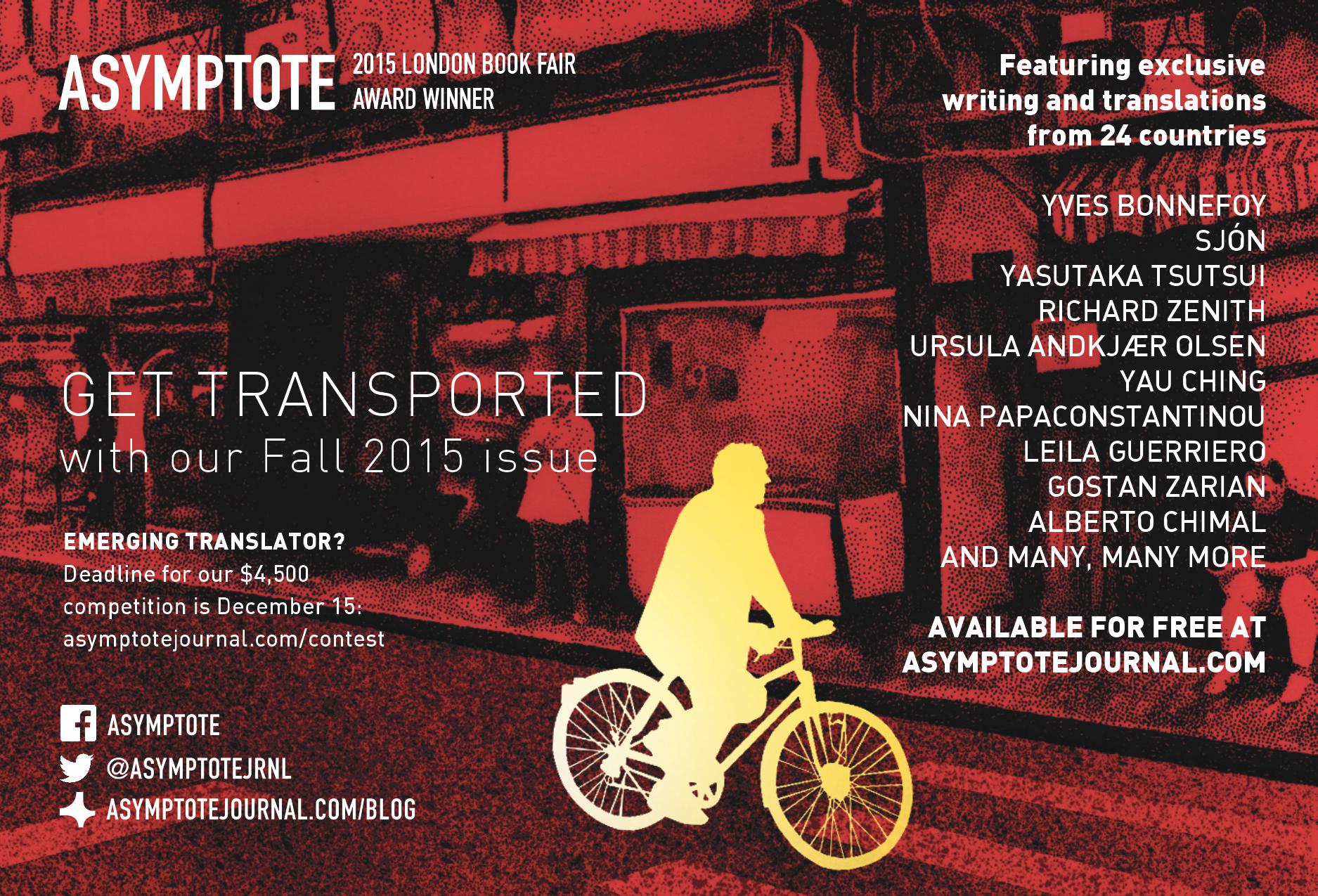In this episode, we look at the concept of home; how we shape it and how it shapes us. Yardenne Greenspan takes a look at literature of trauma, bringing us work by two Israeli authors Yonatan Berg and Ron Dahan, who recount the horrors they have seen (and have been a part of) in their country, as well as Yehiel De-Nur better known by his pen name, Ka-Tzetnik 135633, a Holocaust survivor who in bitter detail recounts his time in Auschwitz. What unites these authors is their experience with LSD. Flashbacks to their traumatic experiences directly inform upon their writing and present the reader with a complex portrait of trauma. Daniel Goulden brings us a report from the Brooklyn Book Fair with recordings of Jonathan Lethem, Vivian Gornick, John Leguizamo, Cecily Wong, and Chinelo Okparanta discussing their respective homes and how that informs upon their work. READ MORE…
Monthly Archives: October 2015
Weekly News Roundup, 30th October 2015: New City, Neustadt

This week's literary highlights from across the world
Hi Friday! Greetings from Tucson, Arizona, which is hosting this year’s American Literary Translators Association conference. Both blog editors Katrine and Patty are in attendance, and happy to tan, talk translation, eat tacos, meet Asymptote‘s long list of contributors and staff, and fangirl about all things lit-related. How exciting that the winners of the National Translation Awards are being announced right as this blog post is being written—stay tuned on this page if you’d like on-the-minute updates, or poke around this corner of the web next week! We’ll be sure to give a full report.
Although the American translation world has stopped for ALTA, translation never sleeps in the other corners of the world. And new issues in translation, globalization, and migration also make room for new terminology: here’s how the concept of “fourth-world” literature can provide opportunities for translating the voiceless. READ MORE…
When an Author You Translate Gets Death Threats

On a visit to Krakow last week, Nobel laureate Svetlana Alexievich spoke out in support of Tokarczuk, whom she called a “magnificent writer."
Acclaimed Polish writer Olga Tokarczuk (pictured) has received a steady stream of hate mail and even death threats after questioning her country’s view of itself as “an open, tolerant country.” As one person put it in a post to Tokarczuk’s Facebook page, “The only justice for these lies is death. Traitor.” Many agree that Tokarczuk’s “betrayal” must be punished; milder comments call for her expulsion from Poland. On a visit to Kraków last week, Nobel laureate Svetlana Alexievich spoke out in support of Tokarczuk, whom she called a “magnificent writer,” saying, “Some people would happily kick me out of Belarus in just the same way others are now calling for Tokarczuk to be removed from Poland.” While others have also expressed their solidarity with the author, the widespread outrage at Tokarczuk’s remarks has yet to subside.
The remarks in question are taken from a television interview Tokarczuk gave shortly after receiving Poland’s highest literary honor, the Nike, on October 4. She was awarded the Nike for her latest book, Księgi Jakubowe (The Books of Jacob), a monumental novel that delves into the life and times of controversial historical figure Jacob Frank, leader of a heretical Jewish splinter group that ranged the Habsburg and Ottoman Empires and the Polish-Lithuanian Commonwealth seeking basic safety as well as transcendence. Tokarczuk’s twelfth book, considered by many critics to be her masterpiece, The Books of Jacob is also a suspenseful and entertaining novel that remained a national bestseller for months after its November 2014 release.
The Afrofuture, for the Time/Being: In Conversation with E. Jane

"...the Internet was always the space where I could mostly engage all of my selves."
Much of my fascination with contemporary Afrofuturism revolves around studying the ways in which Black artists in the field are utilizing the Internet to complicate the idea of ‘alien space.’ Afrofuturism necessarily points to an-other space—traditionally, outer space—as the destination point for the Black human-being, who, being so totally extradited from Earthly society, requires a more total severance in form of a physical migration. The cosmos has, for decades prior, served as the primary landing space for the Black alien migrant, but in recent years, the Internet has made its way to the forefront of the Afrofuture. Relative to cosmic space, the Internet has served as a perhaps closer and seemingly just-as-expansive alternate realm to which to escape. And in fact, the ‘proximity’ of the Internet calls into question whether ‘escape’ is really the dominant motion; rather than, for example, the motion of transformation. (I don’t think that anyone doubts anymore that the relationship between meatspace and cyberspace is mutually mutative.) The contemporary fugitive as shapeshifter and space-shifter.
E. Jane is one such artist who has made the Internet a primary medium. Creating cyber-installations across multiple social media platforms, as well as video, and sound-based works, E. Jane’s work is a seminal voice in the growing field of Internet-based Afrofuturism. Not to mention, E. is also one half of the Philadelphia-based sound-duo named SCRAAATCH—the other half being their partner, chukwumaa. Notably, the duo recently appeared The Fader in a feature titled, “The Voices Disrupting White Supremacy Through Sound.”
E. and I met in cyberspace to chat about their most recent work. We began with a quote from Toni Morrison, whom E. had spent the day reading.
Publisher Profile: Counterpath Press

"We have absolutely no commitment to translation for the sake of translation."
Counterpath is a publisher, gallery, event space, and bookstore. Counterpath was founded in 2006 and has published nearly 50 titles to date. Its gallery and event space opened in late 2010 in Denver, Colorado, hosting over 160 exhibitions, performances, and events. Counterpath’s new venue, at 7935 East 14th Avenue in Denver, is currently under renovation but will be open to the public in 2015. I recently spoke to Tim Roberts via email.
Alexis Almeida: How did Counterpath get started? What was your initial vision for the press?
Tim Roberts: That’s an interesting assumption, that we had a vision, or that a press needs a vision. The implications are many: that we, for some reason, saw something we wanted to accomplish, that we believed needed to be done, something to create that didn’t yet exist, or that was outside what already existed. In some way we believed we could operate, by our own decision, in a way separate from what we might already do automatically— separate from a need to make a living, to not get pummeled by the weather, to bring food to one’s mouth. This was just about a decade back, and I’m not sure I’m prepared at the moment to sketch out lines of developmental continuity that might not make any sense next week or next month. I think you could say we did something in the media, at a time when media was shifting. I think you could say we took something with vaguely personal motives and said this is public, impersonal, objectively valuable, in some way, at some demarcation point, by fiat. We set ourselves up to be believed. Like anyone else, we had an idea of how media works, and how it would work for us. We had an idea of what reading was.
Translation Tuesday: “Chairs and Sentences” by Anna Weidenholzer

"Ferdinand only likes the thin straws, and he likes it when a straw bobs back up after being submerged in a beer bottle."
A brown leather sofa, on it a man, below it a Lurch. A Lurch is a bundle of dirt made of dust, fluff and hair. A Lurch is what I call a Wollmaus. Because the chairs are never cleared away I have a lot to do, the man says. Because the chairs are never cleared away I get angry. But because the chairs are never cleared away I have a job to do. It’s better to have a job than not having a job. Because what would I do if I didn’t have a job. I would just sit at home, sitting at home is nothing, what do you do when you don’t have a job. It’s better to work even if I get the same money I would get if I didn’t work.
The man takes his left hand from his stomach, lays it behind his head, moves his thumb back and forth. Ferdinand watches the man move his left thumb back and forth. Ferdinand watches TV. It’s after ten pm, Ferdinand prefers serious programmes, he appreciates their seriousness and while watching he frequently looks past the television. Is there a hole in the air? A student asked him once; no, a lake, Ferdinand had answered.
Translation as Firework: A Prismatic Rendition of Anna Weidenholzer

"The original is dead. Long live the original."
For my latest event as the Austrian Cultural Forum London’s guest literary curator, I commissioned and curated work for an exhibition presenting multiple translations of a short story by Austrian author Anna Weidenholzer in forms including sound, ceramics, textiles, video, sculpture, photography, text, and even tattoo designs and recipes. A reading and performance event in the ACF’s Salon celebrated and closed the exhibition this week and let the audience all be translators for an evening.
The incredibly affecting short story “Sessel und Sätze” (“Chairs and Sentences”) from Anna Weidenholzer’s collection Der Platz des Hundes (Where the Dog Sits) follows aging school caretaker Ferdinand Felser’s preoccupations with his passive position in the world. Having been mocked as a schoolboy by pupils and teachers for his dialect—and by his parents for trying to change it—Ferdinand is now secretly learning nine languages in his office and is troubled by the climate of xenophobia surrounding him at work, in the news, and among close friends. You can read the story tomorrow on the Asymptote blog.
Posing as a metaphor for the multiplicity of possible translations of any story, the exhibition on display in the ACF’s gallery encouraged the visitor to see how each “translation” altered and added to their reading of the story (which they also read in translation) or how the exhibition could be one multifaceted translation. It considered a translation as a personal reading, extension, destruction or an attempt at honing into an essence of the original text by a “translator,” and also explored the fallibility/adaptability of linguistic translation by further experimenting with alternative translations. READ MORE…
Weekly News Roundup, 23 October 2015: Goog, Good Books

This week's literary highlights, lowlights, and mid-lights from across the world.
Hey, happy Friday! First, brilliant news we’re bursting to tell: The Guardian has just announced their brand-new “books network,” and Asymptote is one of eleven launch partners thus formalized—we’re extra chuffed to be the only one dedicated to world literature! The partnership will see content from both our quarterly and blog shared with The Guardian‘s vast international readership up to eight times a month (all the better to catalyze the transmission of world literature, we say); watch for the very first Asymptote article on this space next Tuesday.
This week, we noted technological inroads into the way we read: giant love-em-or-hate-em behemoth Google won a big fair use lawsuit—and its massive Internet-library project means literally billions of books are set to be scanned for your onscreen perusal. And upon the announcement that the New York Times will partner with Google to provide perusal-via-virtual reality: the future is now.
Speaking of archives—but of the decidedly more old-fashioned kind: Colombian literary giant Gabriel García Márquez’s archive is openly available for research at the University of Texas’ Harry Ransom Center. READ MORE…
Issue Spotlight: Interviewing Uyghur Poetry Translator Joshua Freeman
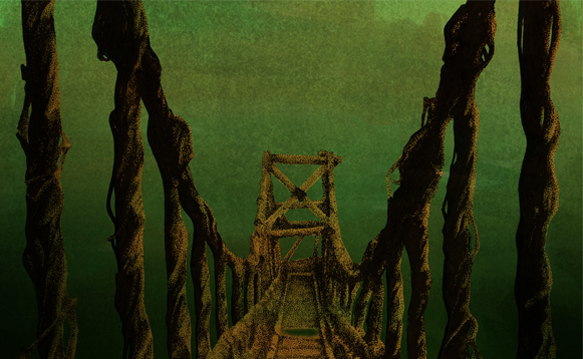
"A lot of what's really vibrant and interesting in Uyghur poetry right now is happening primarily on the web, and even on phone messaging apps."
Your translation of Merdan Ehet’éli’s poem “Common Night” is Asymptote‘s first piece from the Uyghur. I want to point out two words from the poem: “pig iron” and “hellfruit.” Can you tell us about these words and how you translated them?
The Uyghur word choyun (also chöyün) refers to pig iron or cast iron, and for me it calls to mind something hard and rough. The connotations are much less positive than the words tömür (iron) and polat (steel), both of which are used in Uyghur personal names. In speaking of “a night poured into our spines like pig iron,” Merdan Ehet’éli may be alluding to Tahir Hamut’s well-known poem “Summer Is a Conspiracy,” in which Tahir refers to fear’s “pig iron voice”, which “seeps into the marrow / and hardens.” READ MORE…
The Tiff: How Should We Review Translations?
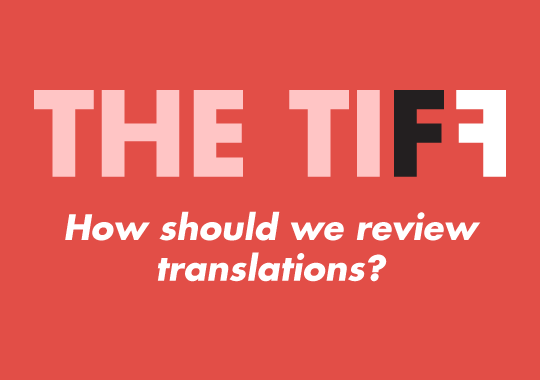
Sue Burke and Maia Evrona on the ideal review for a translation—and the tendency to forget the translator entirely.
Sue Burke: The book review said that Angelica Gorodischer “writes poetic, vigorous prose.” Yes, she does. And she doesn’t – that is, I wrote the poetic, vigorous prose.
I’m the translator for Gorodischer’s novel Prodigies, published this year by Small Beer Press. The review was in Kirkus. At least it listed me as the translator and it was favorable, even if it wasn’t ideal.
What would be an ideal review for a translation? While any book review has to cover a lot of ground, at some point I think it ought to explicitly acknowledge that the work being reviewed is a translation and mention its apparent approach, since a translation in some way rewrites the original. If possible, it might compare a passage of the original to the translation and note whether the translation wrestles successfully (or not) with linguistic and cultural challenges, captures its literary quality like elegance or immediacy or wit, and accurately conveys both the meaning and subtext.
Translation Tuesday: “Breaking Through the Drum” by Bohumil Hrabal
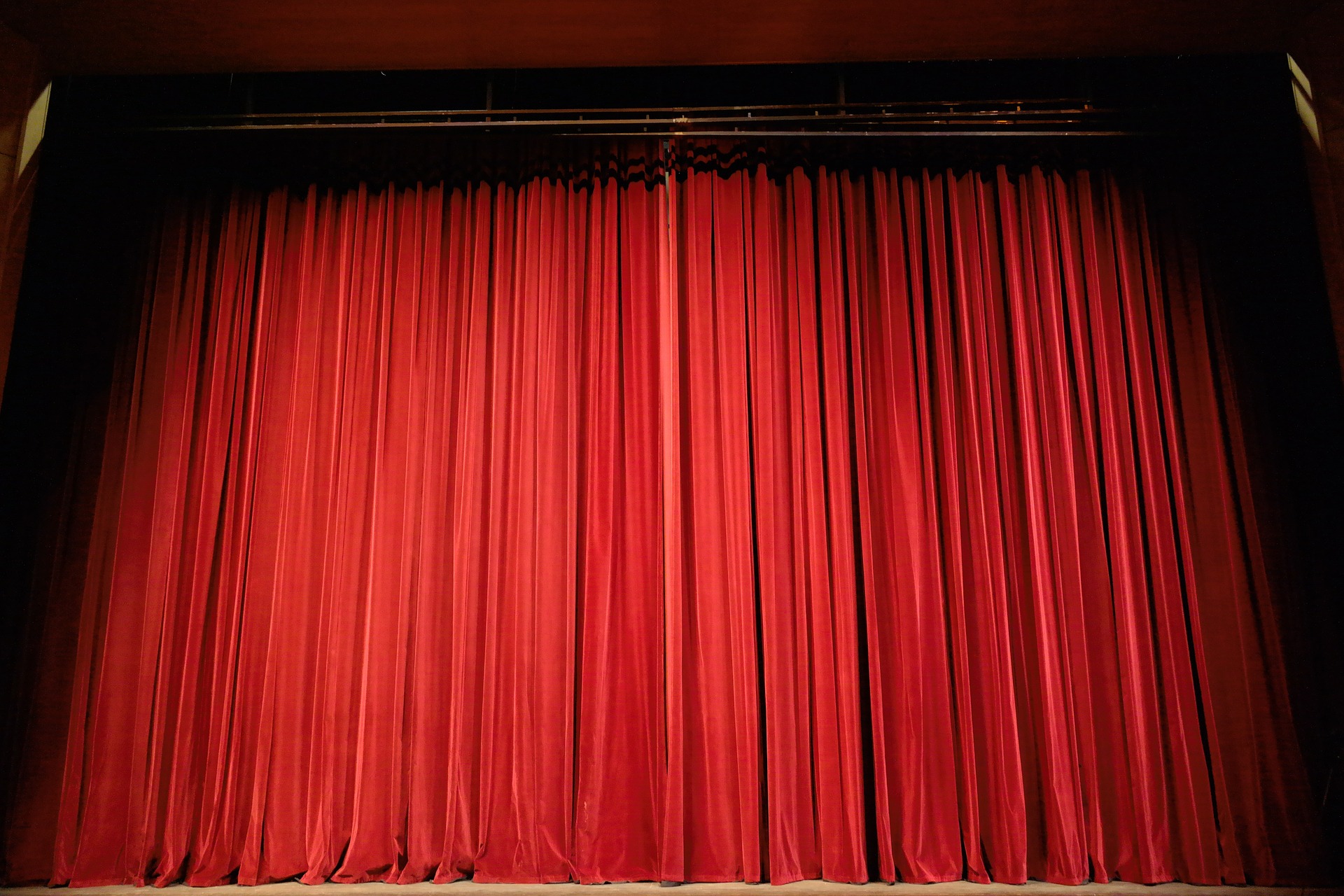
"and everything suddenly seemed so bizarre I thought my ticket-taker’s demon must have come back to play with my mind."
I never felt better than when I was tearing the stubs off people’s tickets and showing them to their seats. In primary school, I loved to make seating plans for the teacher. Then during the war, a weird thing happened to me. A kind of ticket-taker’s demon lit on my back and right in the middle of the newsreel, when the voice announced that eighty-eight enemy aircrafts had been shot down over Dortmund and only one German plane had gone missing, the perverse little imp whispered something in my ear, and I said in a loud voice: “Aw shucks, it’s bound to turn up again.” My voice sounded like it belonged to somebody else, so I turned up the house lights and ordered the person who’d said it to come forward. The other ushers and I walked through the audience, but no one confessed and so, invoking our official powers—we actually had such powers—I declared that the entire program, including the feature film, was hereby cancelled, the tickets were null and void and, as punishment, everyone had to go home without a refund. READ MORE…
Translator’s Profile: Yardenne Greenspan
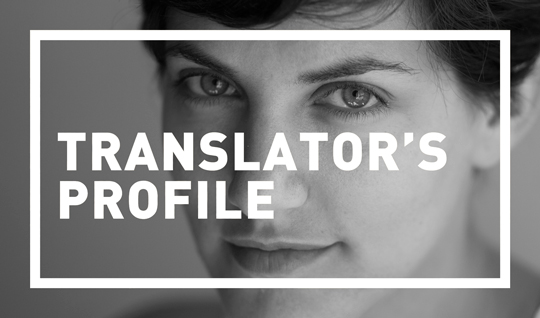
"I also sometimes fantasize about acting or opening a bakery."
Yardenne Greenspan has an MFA in Fiction and Translation from Columbia University. In 2011, she received the American Literary Translators’ Association Fellowship. Her translation of Some Day, by Shemi Zarhin (New Vessel Press), was chosen for World Literature Today’s 2013 list of notable translations. Her full-length translations also include Tel Aviv Noir, edited by Etgar Keret and Assaf Gavron (Akashic Books), and Alexandrian Summer by Yitzhak Gormezano Goren (New Vessel Press). Yardenne’s writing and translations can be found in The New Yorker, Haaretz, Guernica, Ploughshares, The Massachusetts Review, and Words Without Borders, among other publications.
*****
Who are you and what do you translate?
My name is Yardenne Greenspan, I’m a writer of fiction and essays, a translator of Hebrew fiction, and an aspiring good friend. I mostly translate novels, but also short prose, plays, and even some poetry.
Describe your current/most recent project. Why is it cool? What should we know about it?
I just finished translating a biblical-fiction novel by Israeli author Yochi Brandes, which is forthcoming from St. Martin’s Press next summer. The novel offers a subversive reading of the biblical books of Kings and undermines what we know about Kings Saul, David, Solomon, and their families. It was especially exciting for me, having grown up in Israel, where Bible lessons are taught at every school, forming a very specific narrative of “good” and “wicked” kings. This books really turns it around.
What author would you like to see more popular/translated in the first place?
Sayed Kashua, a Palestinian citizen of Israel who currently lives and works in Illinois, writes in Hebrew about the experience of living on both sides, trying to pass as Israeli while remaining faithful to his Palestinian roots, and the entrapment that ensues. Sadly, Kashua recently decided his attempt to bridge the conflict through his writing has failed, but his writing still offers incredible insight into the complicated and heartbreaking way of living that is Israel. His books have been translated by Miriam Shlesinger and Mitch Ginsburg, and I think they should be read by anyone who is interested in a fresh take on the subject that is both touching and hilarious. READ MORE…
Weekly News Roundup, 16 October 2015: Extra! Extra Money!

This week's literary highlights from across the world.
First things first: our brand-spankin’ new October issue is hot from the digital presses, and it’s more than worthy of your weekend perusal. With heavyweights like Yves Bonnefoy, Sjòn, and Yasutaka Tsutsui (among so many others!) you can’t go wrong, but in case you’re feeling overwhelmed, we featured five of our favorite pieces on the blog yesterday—check it out!
This week also marked the announcement of this year’s Man Booker Prize—and for the very first time, the award went to a Jamaican writer. Marlon James snagged top honors for his novel, A Brief History of Seven Killings. Often poised as an “imitation-Man-Booker,” the prestigious German Book Prize was awarded to Frank Witzel’s Die Erfindung der Roten Armee Fraktion durch einen manisch-depressiven Teenager im Sommer 1969 (deep breath). The award was a surprise, but deserved—and we’re crossing our fingers for a quick and successful translation to hit English markets soon.
But while American National Book Awards have announced its shortlisted finalists, we’re altogether more interested in the American Translation Award shortlist, posted this week over at ALTA, and the list includes several friends of the blog and journal!


